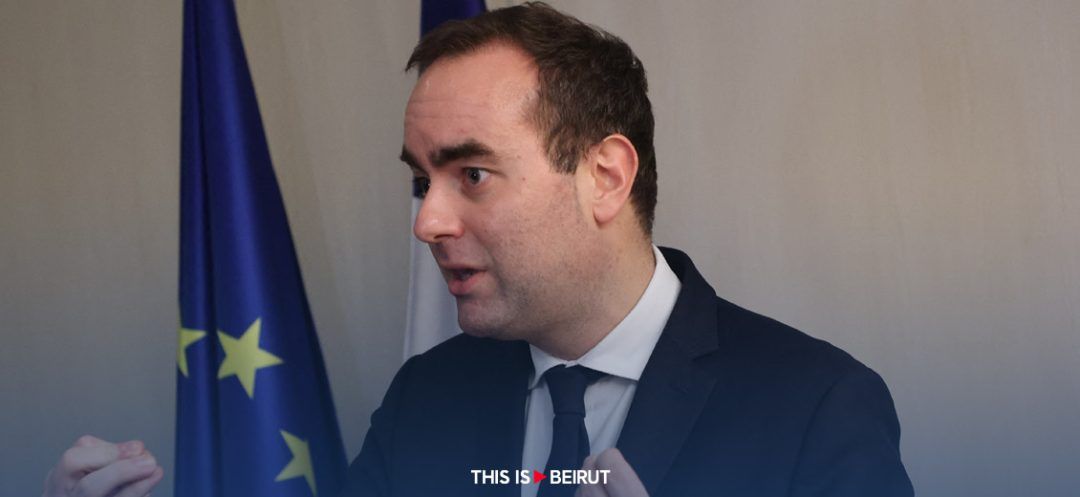- Home
- War in the Middle East
- Lecornu: France Wants to Avoid 'Escalation' Between Israel and Lebanon

©(AFP)
“France wants to avoid a border ‘escalation’ between Israel and Lebanon,” reiterated French Minister of Defense Sébastien Lecornu on Monday in Tel Aviv, where he met with political figures, including Israeli Prime Minister Benjamin Netanyahu.
“When you delve into their minds, into their hearts, no one, not in Tel Aviv, not in Jerusalem, not in Beirut, wants war (...) The real issue for us is to ensure that this escalation, which may seem inevitable, does not occur,” said Sébastien Lecornu in an interview with AFP.
The priority, according to him, is to establish how UN Security Council Resolution 1701 “can once again be implemented, how patrols can be resumed, how a pattern of observation and deconfliction can be re-established” so that “one side does not fire on the other side of the border and the other side (...) does not retaliate, with the risk of an escalation.”
Resolution 1701 put an end to the 2006 war between Hezbollah, supported by the Iranian-Syrian axis, and Israel. It established, in principle, the sole presence of the Lebanese army and the United Nations Interim Force in Lebanon (UNIFIL) in the south of the country, between the border and the Litani River.
Lebanon said it was ready to implement the agreement, on condition that Israel ceases its attacks and withdraws from areas claimed by Beirut. “This is based on a commitment by both parties,” insisted the French Minister, announcing that he would be visiting Lebanon “fairly soon.”
Many civilians have been evacuated on both sides of the border, he noted, adding that their protection “is an important point on which we need to make progress.”
Some 700 French troops are mobilized as part of UNIFIL in southern Lebanon. Paris supports the Lebanese Armed Forces (LAF) by supplying them with medicine, while Qatar and the United States have provided occasional assistance to pay soldiers’ salaries.
In southern Lebanon, exchanges of fire between Israel and Hezbollah, which the latter claims to be acting in support of Hamas, have been occurring almost daily since the start of the war between the Palestinian Islamist movement and Israel in the Gaza Strip in October.
The number of people killed by Israel in southern Lebanon exceeded 200 on Monday, including 147 Hezbollah fighters, according to an AFP count. In Israel, the authorities announced the deaths of nine soldiers and six civilians.
E.Z with AFP
“When you delve into their minds, into their hearts, no one, not in Tel Aviv, not in Jerusalem, not in Beirut, wants war (...) The real issue for us is to ensure that this escalation, which may seem inevitable, does not occur,” said Sébastien Lecornu in an interview with AFP.
The priority, according to him, is to establish how UN Security Council Resolution 1701 “can once again be implemented, how patrols can be resumed, how a pattern of observation and deconfliction can be re-established” so that “one side does not fire on the other side of the border and the other side (...) does not retaliate, with the risk of an escalation.”
Resolution 1701 put an end to the 2006 war between Hezbollah, supported by the Iranian-Syrian axis, and Israel. It established, in principle, the sole presence of the Lebanese army and the United Nations Interim Force in Lebanon (UNIFIL) in the south of the country, between the border and the Litani River.
Lebanon said it was ready to implement the agreement, on condition that Israel ceases its attacks and withdraws from areas claimed by Beirut. “This is based on a commitment by both parties,” insisted the French Minister, announcing that he would be visiting Lebanon “fairly soon.”
Many civilians have been evacuated on both sides of the border, he noted, adding that their protection “is an important point on which we need to make progress.”
Some 700 French troops are mobilized as part of UNIFIL in southern Lebanon. Paris supports the Lebanese Armed Forces (LAF) by supplying them with medicine, while Qatar and the United States have provided occasional assistance to pay soldiers’ salaries.
In southern Lebanon, exchanges of fire between Israel and Hezbollah, which the latter claims to be acting in support of Hamas, have been occurring almost daily since the start of the war between the Palestinian Islamist movement and Israel in the Gaza Strip in October.
The number of people killed by Israel in southern Lebanon exceeded 200 on Monday, including 147 Hezbollah fighters, according to an AFP count. In Israel, the authorities announced the deaths of nine soldiers and six civilians.
E.Z with AFP
Read more



Comments